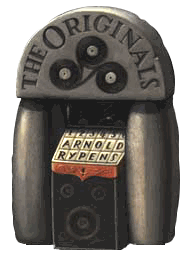ST. JAMES INFIRMARY
Created on 07/09/2006Latest update on 15/04/2024
Artist: Fess Williams & His Royal Flush Orch.
Author: Joe Primrose
Label: Vocalion
Year: 1927
As Gambler Blues (St. James Infirmary Blues). Lyrics credited to Irving Mills under his alias Joe Primrose. It stands for the black variation of a much older song root. The basic outline may have been written by Scottish piper MacCrimmon well before the 17th century and used in 18th century ballad The Unfortunate Rake or The Unfortunate Lass, about someone dying of syfilis on the stairs to St. James' Hospital. In 1960 a VA-album entitled The Unfortunate Rake was released by Folkways, dealing exclusively with variations on this tune and song subject, no matter who dies in it (a gambler, a soldier, a sailor, a prostitute...), who's visiting the dying, no matter where the action takes place (in Old Joe's barroom, in St. James' Hospital or even in the streets of Laredo), long as there's a final request for a decent funeral ceremony (which all versions share). A version as The Unfortunate Rake has been collected in 1906 in Lyme Regis, Dorset by Henry Hammond. In 1848 the earliest Fortunate Rake was localized in county Cork in Ireland, sung by someone who'd learned the tune in Dublin in 1790. Irish roots also reflect in the tune of The Bard Of Armagh, song about local 18th century poet Phelin Brady. John McCormack recorded a version in 1920 for Victor. See also: The Nightingale.
There's been a St. James Methodist Church offering first aid and modest hospital facilities in New Orleans, some even claim it was located right in the middle of Storyville, the famous red light district where Jelly Roll Morton used to play as a piano professor. But the lyrics were in use long before Storyville was outlined, so the 'real' St. James Infirmary the song was based upon was probably St. James' Workhouse in Poland Street, London, established by the Parish of St. James in 1728 and described in 1732, holding 8 wards, 4 for women, 2 for men, 1 for boys and 1 for girls. There was a ward for 'lying-in women', brought in straight from the streets to give birth, while another ward was an infirmary. For its venerial disease allusion, the song was frequently banned. John A. Lomax collected a bunch of far west variations as The Dying Cowboy and/or The Streets Of Laredo. How do these Laredo variations relate with the St. James Infirmary/Bad Girl/Unfortunate Rake/Gambler Blues root? The dying subject (male or female) always requests for a decent burial ceremony.
Covers:
- 1927:
Henry Puckett [as The Dying Cowboy]
- 1927:
Vernon Dalhart [as Cowboy's Lament]
- 1928:
Buell Kazee [as Gambling Blues]
- 1929:
Hokum Boys [also as Gamblers Blues (St. James Infirmary)]
- 1929:
Louis Armstrong & His Savoy Ballroom Five [must have known the St. James church mentioned in the lyrics, for he delivered coal to the cribs of the Storyville prostitutes as a child]
- 1929:
Bradley Kincaid [as In The Streets Of Laredo]
- 1930:
Jimmie Rodgers [as Those Gambler's Blues and later as Gambling Bar Room Blues]
- 1930:
- 1930:
- 1930:
Emmett Matthews [as The Dying Gambler]
- 1930:
Goebel Reeves [as Blue Undertaker]
- 1930s:
- 1931:
- 1935:
Dixie Ramblers [as Barroom Blues]
- 1936:
Fiddlin' Arthur Smith & his Dixieliners [as Chittlin' Cookin' Time In Cheatham County]
- 1938:
Texas Gladden [as Bad Girl (One Morning In May); Lomax recording; goes with a warning and compassion, in line with her strict Mormon upbringing; the venerial disease in her version is of course the wrath of God; on the first released lp for the Archive of Folk Culture within the Library of Congress where Alan Lomax worked for: Anglo American Ballads Vol. 1]
- 1939:
- 1942:
- 1942:
Blind Willie McTell [as Dying Crapshooter's Blues, the link to Dylan's Blind Willie McTell; that's Willie's own melody, but the lyrics are clearly borrowed from the St. James Infirmary root; no one asks for a poshier funeral: he wants twelve policemen in his funeral march, Black Jack to lead the parade and a grave to be digged by the Ace of Spade]
- 1944:
Patti Page [as The Dying Cowboy]
- 1944:
Ray Noble [idem]
- 1946:
Josh White [as Free And Equal Blues; with a human rights dimension; criticising WW II policy whereby blood transfusions for American soldiers were segregated; a white soldier could not receive plasma from a black donor and vice versa]
- 1947:
Jack Teagarden [as part of Louis Armstrong & His All Stars]
- 1949:
Victor Young Orch. [as Streets Of Laredo, film title track; vocal: Dick Haymes; credited to Jay Livingston/Ray Evans]
- 1956:
Dick Curless [idem]
- 1956:
Pete Seeger [idem]
- 1957:
Rambling Jack Elliott [idem]
- 1959:
Dave Van Ronk [as Gambler's Blues]
- 1959:
Eddy Arnold [as Streets Of Laredo]
- 1960:
Danny Dill [idem; he wrote The Long Black Veil]
- 1960:
Don Gibson [idem]
- 1960:
Emmettones [Scottish trio; melody in Bold Robert Emmett; n°1 IRE]
- 1960:
Joan Baez [as Streets Of Laredo]
- 1961:
- 1962:
- 1962:
Texian Boys [with Alan Lomax as Streets Of Laredo]
- 1964:
- 1964:
- 1964:
Shirley Collins & Davy Graham [as Bad Girl; once Alan Lomax' sweetheart, Shirley knew Texas Gladden's version]
- 1964:
Alan Lomax [as The Dying Cowboy]
- 1965:
- 1965:
Jimmy Smith [insgtrumental]
- 1965:
Eddy Mitchell [as J'avais deux amis; ode to Buddy Holly & Eddie Cochran]
- 1965:
Johnny Cash [as Streets Of Laredo]
- 1966:
- 1968:
- 1968:
Willie Nelson [as Streets Of Laredo]
- 1970:
Marty Robbins [idem]
- 1970:
Tommy Makem [as The Bard Of Armagh]
- 1971:
Jim Reeves [as Streets Of Laredo]
- 1972:
- 1977:
Lal & Norma Waterson [as The Unfortunate Lass]
- 1980:
Archie Shepp [instrumental]
- 1981:
John Cale [as Streets Of Laredo]
- 1983:
Bob Dylan [melody in Blind Willie McTell, outtake of Infidels; knew this melody through Dave Van Ronk's Gambler's Blues; in his song Dylan sings: "I'm staring out the window of the old St. James Hotel"; there is one in his state of Minnesota, with a view on Highway 61 (Main Street in Red Wing, Minnesota)]
- 1984:
- 1988:
Danny Barker [New Orleans legend who've seen 'em all come and go; once played with Buddy Bolden and became curator for the local jazz museum]
- 1989:
- 1990:
Kate & Anna McGarrigle [as St. James Hospital (Cowboy Lament)]
- 1991:
- 1993:
- 1995:
- 1995:
Webb Wilder & The Nashvegans [as Streets Of Laredo]
- 1997:
Vince Gill [as Streets Of Laredo on Irish concept album Long Journey Home]
- 1998:
- 1999:
- 1999:
Ramblin' Jack Elliott [with Dave Van Ronk]
- 1999:
- 1999:
Harry Connick Jr. [in medley with Just A Closer Walk With Thee]
- 1999:
Snakefarm [with Anna Domino]
- 1999:
Doc Watson [with his grandson Richard Watson]
- 2000:
Vera Coomans & Tom Theuns [she from Madou, he from Ambrozijn]
- 2000:
- 2001:
Marc Ribot [instrumental]
- 2001:
Rob Van Appeven [in medley with Rozhinkes mit Mandeln]
- 2001:
Prefab Sprout [as Not Long For This World (Streets Of Laredo)]
- 2003:
Freek de Jonge [as Onze Lieve Vrouwe]
- 2003:
- 2003:
- 2004:
- 2004:
Jools Holland & Tom Jones [in a BBC documentary Jools supports the theory of this song's London roots]
- 2005:
Eliza Carthy [as The Unfortunate Lass]
- 2005:
Jim Causley [as Young Man Cut Down In His Prime on cd Song Links 2; Cecil Sharp heard his first version as such in 1904 by Tom Spracklar of Somerset, once a soldier, just like the victim in his ballad]
- 2005:
Sara Grey & Kieran Means [as Bad Girl (One Morning In May) with lyric line: "Had she but told me about it in time, I might have got salted pills of white mercury", the army remedy against syfilis at the end of the 18th century]
- 2005:
- 2008:
- 2009:
- 2010:
Preservation Hall Jazz Band [vocal: Paolo Nutini]
- 2010:
Brendan Croker & Bruno Deneckere [followed by a version of Streets Of Laredo]
- 2011:
- 2016:
Rhiannon Giddens [with Yo-Yo Ma]
- 2017:
- 2018:
- 2021:
Chrissie Hynde [as Blind Willie McTell]
Part of the SJI-tune is quoted clearly in a song called In A Charleston Cabin, frequently recorded as an instrumental in 1924, by Whitey Kaufman's Original Pennsylvania Serenaders, The Carolina Club Orchestra (with Hal Kemp) and Saxi Holtsworth's Harmony Hounds. It is also mentioned in Carl Sandberg's American Songbag (1927) as Those Gambler's Blues.


